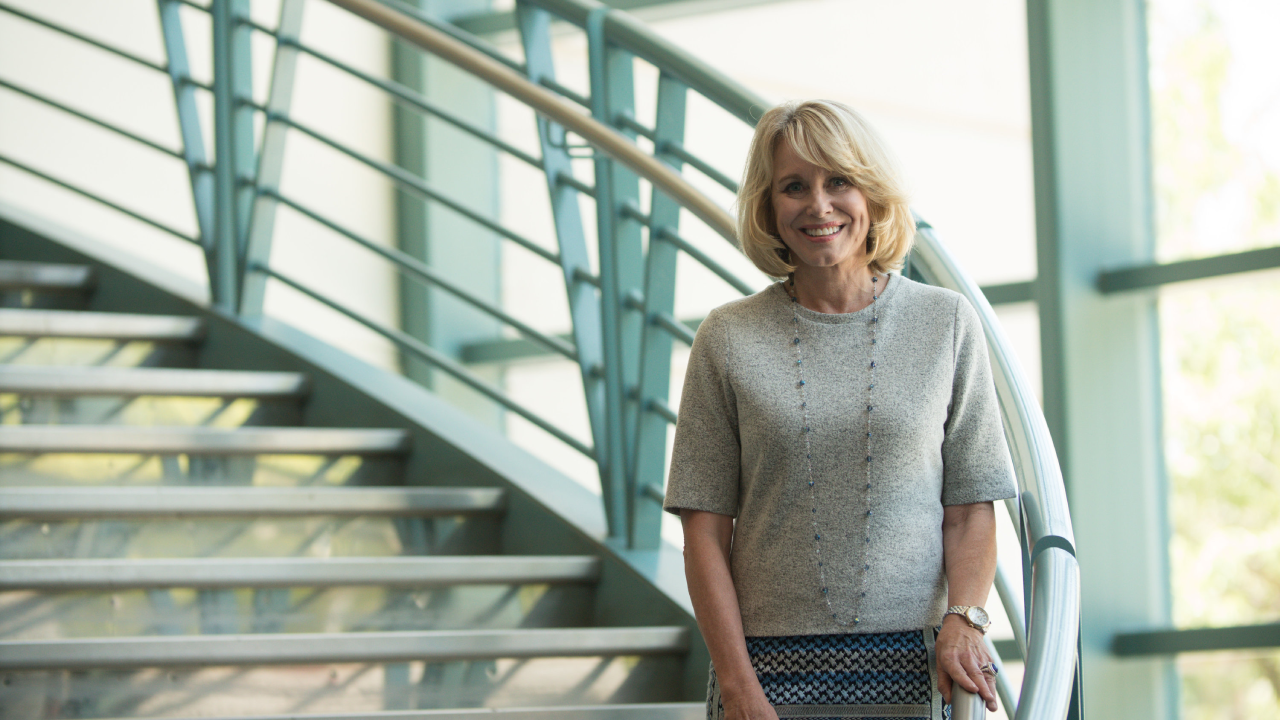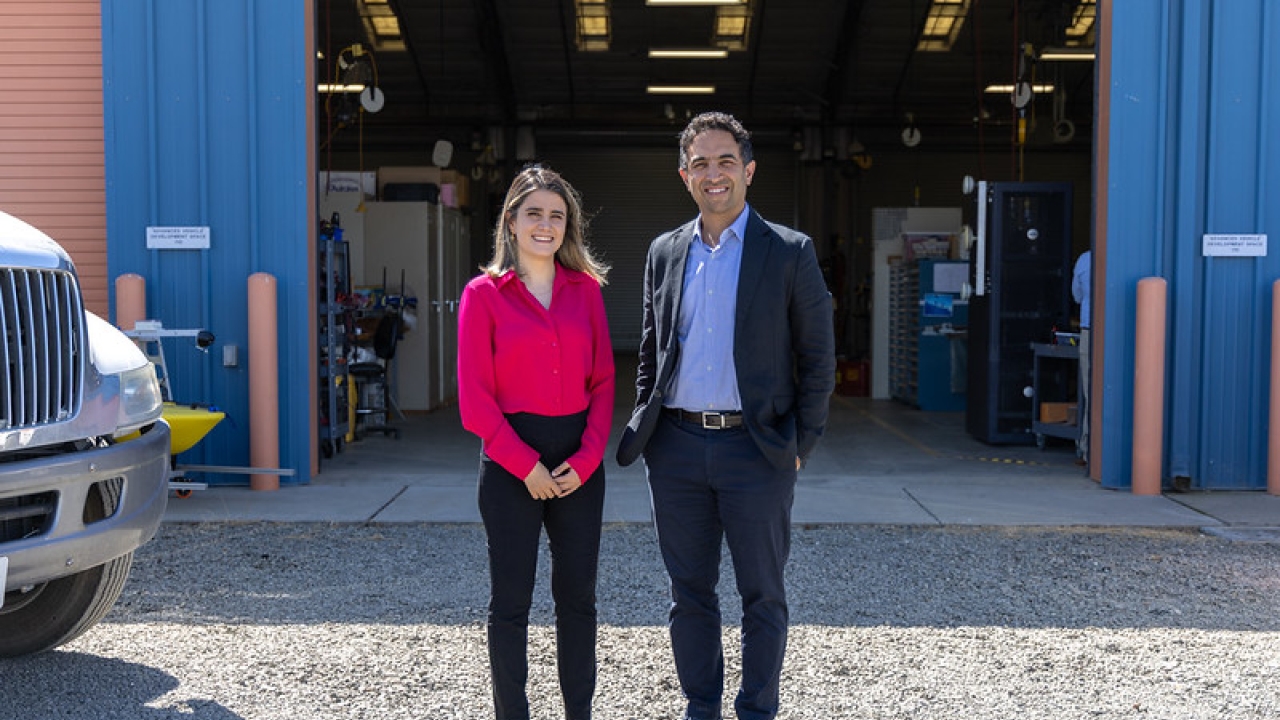
Alumni Spotlight: Diane Bryant, '85
UC Davis electrical engineering alumna Diane Bryant (’85) is one of the most powerful women in tech. Most recently, she was the chief operating officer of Google’s Cloud Platform where she managed Google Cloud’s supply chain optimization, customer adoption and IT product development efforts. She was previously the senior vice president and general manager of Intel Corporation’s Data Center Group, a role that landed her on Fortune’s “50 Most Powerful Women in Business” and Business Insider’s “Silicon Valley’s 100” lists, among other accolades.
Unlike some of today’s tech leaders, Bryant’s success did not begin in an Ivy League dorm room.
Instead, when Bryant was 18 years old, she was homeless. After graduating from Bella Vista High School in Fair Oaks, Calif. she started free community college classes at American River College. She juggled three waitressing jobs to make ends meet.
Although she was enrolled in science and math-intensive courses at America River College, she had never considered pursuing engineering. That all changed one day when a classmate struck up a conversation with Bryant. He told her that engineers had the highest starting salary for graduates with a four-year degree.
Bryant recalls marching down to the counselor’s office and declaring that she wanted to be an engineer. Her counselor enthusiastically responded, “That’s great! What kind of engineer? Hardware or software?”
After a brief moment of panic – at the time Bryant confessed she knew very little about what an engineer actually did – she landed on hardware engineering.
Bryant took advantage of the transfer agreement between Sacramento area community colleges and UC Davis, transferring to Davis in 1983.
“Those two years at Davis were truly the best years of my life,” Bryant says. “That time and my degree in electrical engineering absolutely enabled me to accomplish what I have in the tech world.”
By the time Bryant graduated in 1985, she had attracted 11 engineering job offers, ultimately accepting one from Intel given it was the only offer in her hometown of Sacramento, enabling her to remain close to her mom. “A UC Davis engineering degree was a strong magnet for employment,” Bryant remembers. “It still is.”
On leadership, grit and social intelligence
When Bryant first joined Intel, the personal computer had just hit the market. Her career has seen her through all of society’s major computing evolutions. From the launch of PCs to the revolutionary arrival of cloud computing, Bryant has designed technologies and led successful engineering teams through them all.
Over the course of her nearly 35-year career in tech, Bryant has also shattered glass ceilings for women. Her early leadership roles included serving as general manager of Intel’s Server Platforms Group and then director of the Corporate Platform Office, where she led Intel’s transformation into a platform-directed company. Early in her career she was director of engineering of the Mobile Products Group, followed by a stint as general manager of the Enterprise Processor Division, which was responsible for the architecture, design and delivery of Intel’s Xeon processor families – the processor that went from absent to now over 95% share of the world’s servers during Bryant’s time.
Under Bryant’s leadership in 2017, Intel’s Data Center Group generated $19 billion in revenue, nearly half of the company’s overall earnings for that year.
Bryant attributes her success to always being open to the next opportunity, the next challenge and the next problem to be solved. She also cites her grit and emotional intelligence.
“When a new project arose at Intel, I accepted the challenge without pause despite the lack of clarity on what the solution would be, or how I could be successful,” Bryant says. “But I knew success was important to the company and I knew I was going to figure it out – that’s grit.”
Another part of grit is creating your own luck, Bryant says. “Because things aren’t always going to fall into place, you have to be someone who can manufacture luck and opportunity.”
Bryant’s strong emotional intelligence – her ability to navigate complex social relationships and organizational structures – has also helped her become an influential leader in the tech world. Emotional intelligence is an underrated skill, especially in the engineering world, Bryant says.
“Anytime you’re working within a corporation, there are complex social relationships and environments to navigate, especially as a leader. It’s your job to engage the organization and help them see the opportunity in everything they do.”
Looking ahead: big data and artificial intelligence
Since her departure from Google Cloud last year, Bryant has been elected to Broadcom’s board of directors and continues to keep her finger on the pulse of global tech trends.
As cloud computing becomes increasingly ubiquitous, Bryant says the potential to harness big data for applications like artificial intelligence is tremendous.
“Cloud computing has created an incredible opportunity. People now have access to a highly-efficient compute model, which allows more and more devices and ‘things’ to become connected, in turn generating massive amounts of data. This creates the opportunity for new discovery through artificial intelligence.”
Big data is a game changer, Bryant explains. She believes in the power of big data and artificial intelligence to move society forward, citing the application of artificial intelligence to develop autonomous vehicles and to feed the world’s growing population through smart farming.
“Farming, the oldest industry on the planet – founded in 10,000 BC – is an early adopter of cutting-edge AI technology. Combining data sources from soil samples with weather forecasts and satellite imagery of the fields, along with sensor data from the faming equipment, the farmer suddenly has the information needed to generate healthier crops with increased yield Bryant also acknowledges AI critics but says the benefits far outweigh the risks.
When Intel got into the server business, the reduced cost of compute meant anyone could have a large-scale, high-performance computer. Massive compute capacity would no longer be limited to governments and large academic institutions. The result was people worried that technology would land in the wrong hands and anyone could then result in uncontrolled development of nuclear weapons using commercial, off-the-shelf servers, she remembers.
“But you can’t be encumbered by fear and throw up your hands in despair when the topic is controversial, as is AI. As leaders in the industry, we have a responsibility to ask the hard questions and invest in understanding both the risks and rewards, look at all sides of the technological advancements and the use cases, and fight for fair, humane, democratic and beneficial applications.”
“Artificial intelligence is still nascent, it’s still evolving and it’s definitely a hotly debated topic. This is a natural state for a complex issue filled with unknowns. But that’s why the exploration is so exciting and so fun.”




